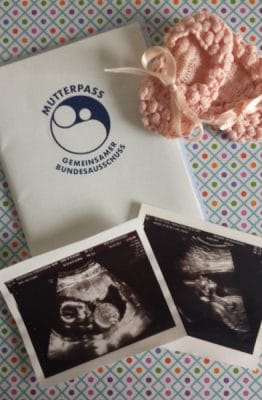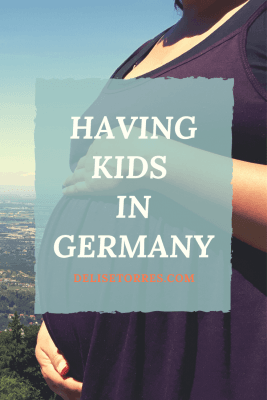This is part of my ongoing series on surviving in Germany based on my own experiences. Having kids in Germany is just like having kids anywhere else – the hope, the pain, the joy at seeing that tiny face for the first time. But the German government provides many regulations aimed at helping out parents take time off to take care of their children without suffering financially. In fact, Germany ranks as the 6th most family-friendly country in the world, according to a study by UNICEF. Here are some of the ways having kids in Germany distinguishes itself.
Mutterpass
As soon as a pregnancy is confirmed, women receive this booklet from their doctor or midwife. It holds all of her personal information, expected due date, and every test performed during her pregnancy. Expectant mothers should always carry it with them in case they are out of town and need to head to the emergency room. That way, any doctor can have an easy overview of the state of her pregnancy.

I found it cool to have all the information in one booklet, including ultrasound images, weights, and measurements. It’s a keepsake I can give to my daughter when she grows up.
Hebammen (Midwives)
Midwives in Germany have roles during pregnancy and labor, as well as after the baby is born.
Many offer prenatal courses, like yoga and birthing classes, as well as other services like massages and acupuncture. They can perform all checks instead of a doctor as long as there are no complications with the pregnancy. By law, they are also present during labor.
During the first 3 months of a baby’s life, midwives perform house visits and help new parents with any questions they have, including help with breastfeeding.
They also offer courses post-pregnancy like postnatal exercises, baby massages, and how to begin with solid foods.
I was lucky to live in a town with a high number of midwives. They joined together to run a practice, where they could offer all of the services mentioned above (and much more). I only needed to sign up and I would have midwife care after the birth. In most towns, you have to search for a midwife early on in the pregnancy to ensure you get one. There’s a scarcity of them due to low incomes
My health insurance covered up to ten hours of courses – so I could take birth preparation classes and the proper use of baby slings – and all the acupuncture and massages I needed. I could also choose to give birth in a birthing house, located inside my local hospital. That way, in case of an emergency, I could see a doctor right away.
Mutterschutz (Maternity Leave)
By law, pregnant women are not allowed to work in the last 6 weeks of their pregnancy and 8 weeks after giving birth.
Mutterschaftsgeld
During this maternity leave, women with publich health insurance can receive a stipend of 13€ per day. When the average daily net income is higher than this amount, the employer must pay the difference (Arbeitgeberzuchuss).
Women who have private insurance or belong to public insurance via a family member can apply for Mutterschaftsgeld from the government. They can receive a maximum one-time payment of 210€.
Elternzeit (Extended Parental Leave)
By law, employers have to give a parent up to 3 years of time off. During this time, parents don’t earn a salary but their job positions remain safe until they return. The parents can divide the 3 years between each other, meaning the mother can take one year and the father the other two.
Legally, parents can have these three years off anytime between birth and when the child turns 8. However, employers have a right to refuse for business reasons once the child turns 3. And as we’ll see with the Elterngeld below, government financial assistance only lasts only until the child is 36 months old.
Elterngeld
Elterngeld is financial help from the government to parents during the first 3 years of the child’s life. To receive it, the parents do not need to be in Elternzeit but are not allowed to work more than 30 hours per week.
The amount of aid depends on the net income prior to the child’s birth but it ranges between 300 and 1800€ per month during the first year of the child’s life. After that, the range drops in half, to 150 to 900€ per month. Therefore, the amount of Elternzeit you can take off depends on the financial situation of the parents.
Parents can determine who takes care of the child and simultaneously, who gets the money, similar to the Elternzeit. For example, the mother can receive Elterngeld during the first eight months and the father receives money from months nine to twelve.
Even though I was unemployed before giving birth, I was entitled to the minimum amount of Elterngeld during the first year. My husband took off two months of Elternzeit. While he is entitled to more, we couldn’t afford the pay cut since he could only earn 1800€ per month.
Kindergeld
Children receive a monthly stipend of 204€ until they reach the age of 18. If they attend university or take part in an apprenticeship, they can receive Kindergeld until the age of 25.

There’s a lot more to these regulations but I hope this summary paints a picture of the different rights families have. In general, I’m happy with my experience and how my delivery went. I really appreciated the help and support of my midwife after the birth. She answered all of our questions and advised us through my breastfeeding difficulties.











